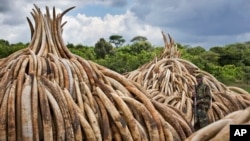Pyramid-shaped piles of ivory rest upon the grasslands of Nairobi National Park, ready for a burning that will mark the close of a three-day high-level summit Saturday.
The massive burning will end the Giants Club summit of African leaders, attended by Kenya’s President Uhuru Kenyatta, the heads of state from Gabon and Uganda, U.N. and U.S. officials, and members of conservation groups.
Robin Hollister, a pyrotechnic expert and former film special effects engineer, is staging the grand gesture against the ivory trade, which threatens to render elephants extinct. It's not an easy job, he said, because “ivory doesn’t burn.”
"It's a show, after all. The burning has to be symbolic," Hollister said, "There'll be ivory towers, nice flames — it will be very visual.”
Hollister said that unless the fire is sustained at high temperatures for a long time, the ivory won't disintegrate.
“If you try to burn it with a match or by throwing it into a fire, it won’t ignite,” he said.
A short distance away from the piles of ivory, thousands of liters of a mixture of diesel and kerosene sit in a tank, waiting to be injected with pressurized air though steel pipes buried in the ground that lead into the heart of the pyramids.
Kenya’s president will torch the largest of the piles.
Kenyan officials hope the fire will render the tusks useless as part of the worldwide campaign to fight elephant poaching. The number of African elephants roaming the continent has plummeted since the beginning of the 20th century to an estimated 400,000 today, down from over 1.2 million. Much of the loss in the past few decades has come from illegal hunting to supply the ivory market.
The Convention on International Trade in Endangered Species of Wild Fauna and Flora (CITES) banned the ivory trade in 1989. However, there are still a number of illegal ivory markets, primarily in Asian countries, which encourage poaching.
Kenya Wildlife Service Chairman Richard Leakey said the market is key to the problem. Ivory is worth about $500 a kilogram to poachers and the price rises by the time it arrives at its destination, he said.
“So my appeal is: Let’s kill the market, once and for all. Let’s never again have ivory across international boundaries,” Leakey said.




